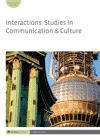
Full text loading...
 , Lars Kjerulf Petersen1
, Lars Kjerulf Petersen1
Climate change mitigation is one of the most important societal challenges, but it is often inaccessible to direct human experience. Hence, climate change and related issues are largely constituted in the public mind from media narrations, which have the potential to push people towards new sustainable practices. This article identifies how media, in this case online newspapers, can affect pro-environmental practice changes. Firstly, we will outline a conceptual framework connecting mediatisation theories to practice theories. Secondly, we will present empirical findings for establishing connections between online news effects and sustainable practice changes and their respective recurring patterns and models.

Article metrics loading...

Full text loading...
References


Data & Media loading...

Publication Date:
https://doi.org/10.1386/iscc.10.1-2.129_1 Published content will be available immediately after check-out or when it is released in case of a pre-order. Please make sure to be logged in to see all available purchase options.